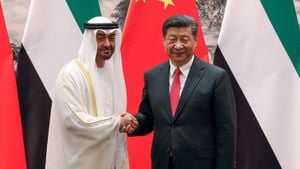Recent diplomatic shifts signal significant changes in how the United States and European Union interact with the rebel group Hayat Tahrir al-Sham (HTS) following the ousting of former Syrian President Bashar al-Assad. U.S. Secretary of State Antony Blinken confirmed on Saturday direct communications with HTS, indicating the possibility of a new approach toward governance and aid within Syria.
"Yes, we have been in contact with HTS and with other parties," Blinken stated, reaffirming America's commitment to assist the Syrian populace as they navigate this transition. His confirmation follows earlier reports and raises questions about the future relationship between HTS and Western powers amid their designation as a terrorist organization.
The EU is also taking steps to cautiously engage with HTS. Kaja Kallas, the Prime Minister of Estonia, who currently holds the presidency of the EU, recently announced plans for direct outreach. She remarked, "I've tasked a European top diplomat in Syria to go to Damascus to make the contacts with the new government and people there." This endeavor signals the EU’s intent to explore normalization of ties with the group, which has been previously blacklisted due to its historical links to al-Qaeda.
While this engagement reflects the bloc's willingness to adapt its diplomatic stance, Kallas emphasized the necessity of demonstrating true governance capabilities. She added, "For us, it's not only the words, but we want to see the deeds going in the right direction. So not only what they are saying, but also what they are doing." This serves as the EU's measured approach, focusing on HTS’s actions rather than its rhetoric before considering any changes to its terrorist designation.
HTS, under the leadership of Abu Mohammad al-Julani, who has recently reverted to using his real name, Ahmad al-Sharaa, has positioned itself as the leading force after Assad’s regime. Following the fall of Assad, HTS established a caretaker government aiming to transition toward greater political legitimacy and economic stability, announcing intentions to shift from state control to freer market principles to draw investment.
These developments come amid broader discussions surrounding Syria’s future governance structure. A recent meeting held in Aqaba, Jordan, included representatives from the U.S., UK, EU, UN, and Arab states, where commitments were made to advocate for human rights and the protection of minorities under any new government structure.
British Foreign Secretary David Lammy articulated the international community's desire for governance reforms, stating, "We want to see a representative government, an inclusive government. We want to see chemical weapons stockpiles secured and not used, and we want to guarantee no continuing violence." This reflects the cautious but optimistic view from the West to work with HTS, considering their significant control over large portions of northwest Syria.
Despite these encouraging overtures, serious concerns persist over HTS's historical human rights abuses, including accusations of arbitrary executions and adherence to strict interpretations of Islamic law. Observers question whether HTS can administer governance with the pluralism and tolerance necessary for Syria’s diverse population, which includes various religious and ethnic groups, such as Sunni Muslims, Christians, and Kurds.
Geir Pederson, the UN special envoy for Syria, emphasized the urgency of lifting sanctions imposed on Assad's regime, which he argues obstruct economic recovery. He stated, "We need to see this fixed quickly. We can hopefully see a quick end to the sanctions so we can see really a rallying around building up Syria again." This viewpoint has the potential to shape future negotiations as Western allies reconsider conditions for engagement with the new Syrian political actors.
Overall, the interaction between the U.S., EU, and HTS marks significant diplomatic maneuvering within the complex geopolitical fabric of Syria. With Turkey recently reopening its embassy in Damascus, the shifts could herald not only structural changes within Syria’s governance but also realignments of regional alliances.
The coming weeks and months are pivotal as both the U.S. and EU watch HTS's actions closely. Whether they can solidify their governance claims and gain the trust necessary for broader international support remains uncertain. For now, direct engagement signifies tentative steps toward recognizing the new political reality within Syria.



